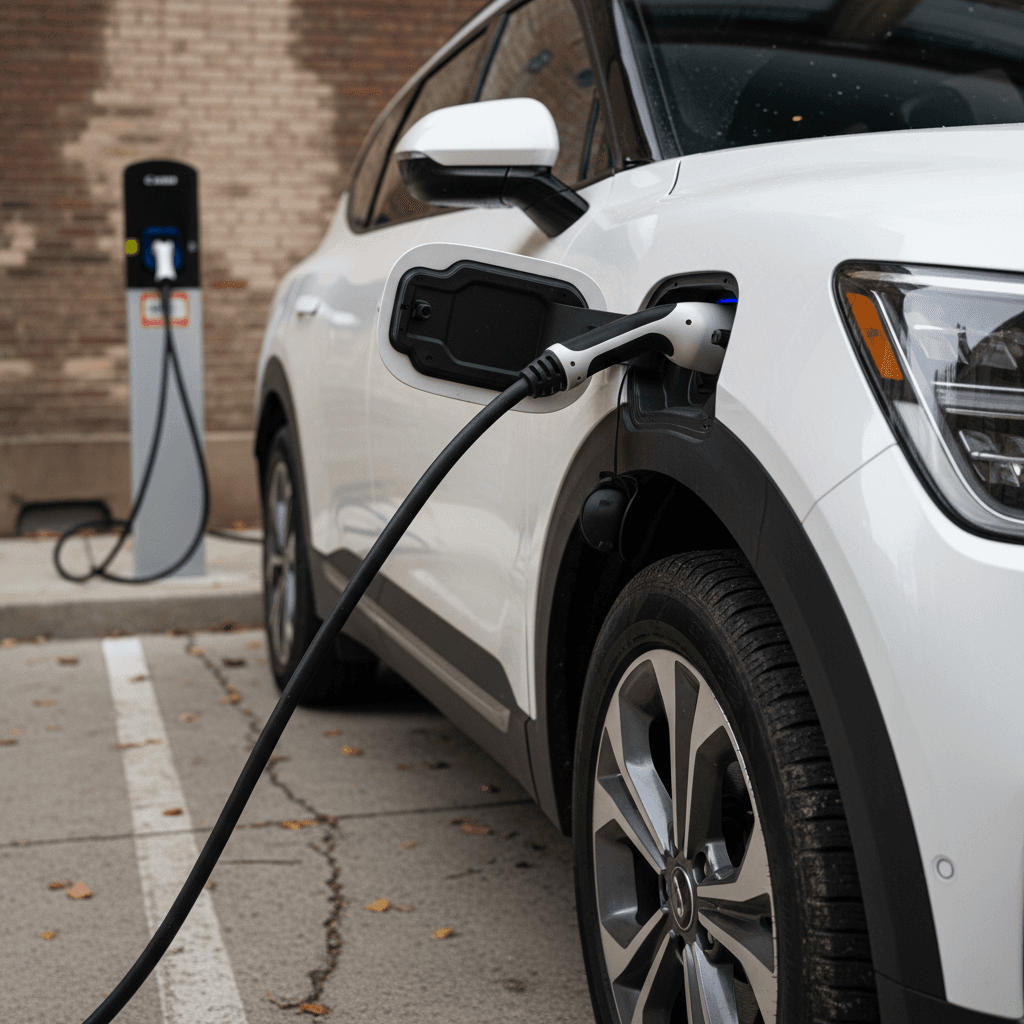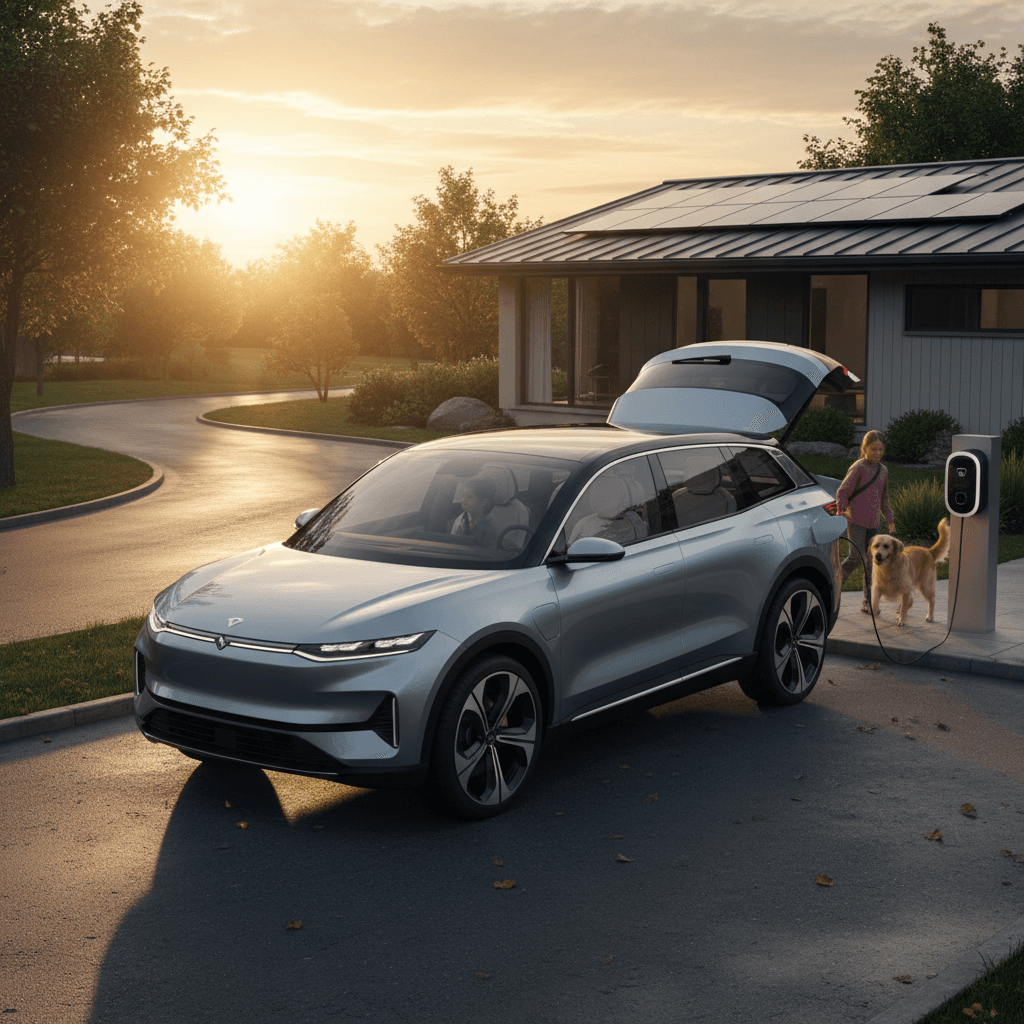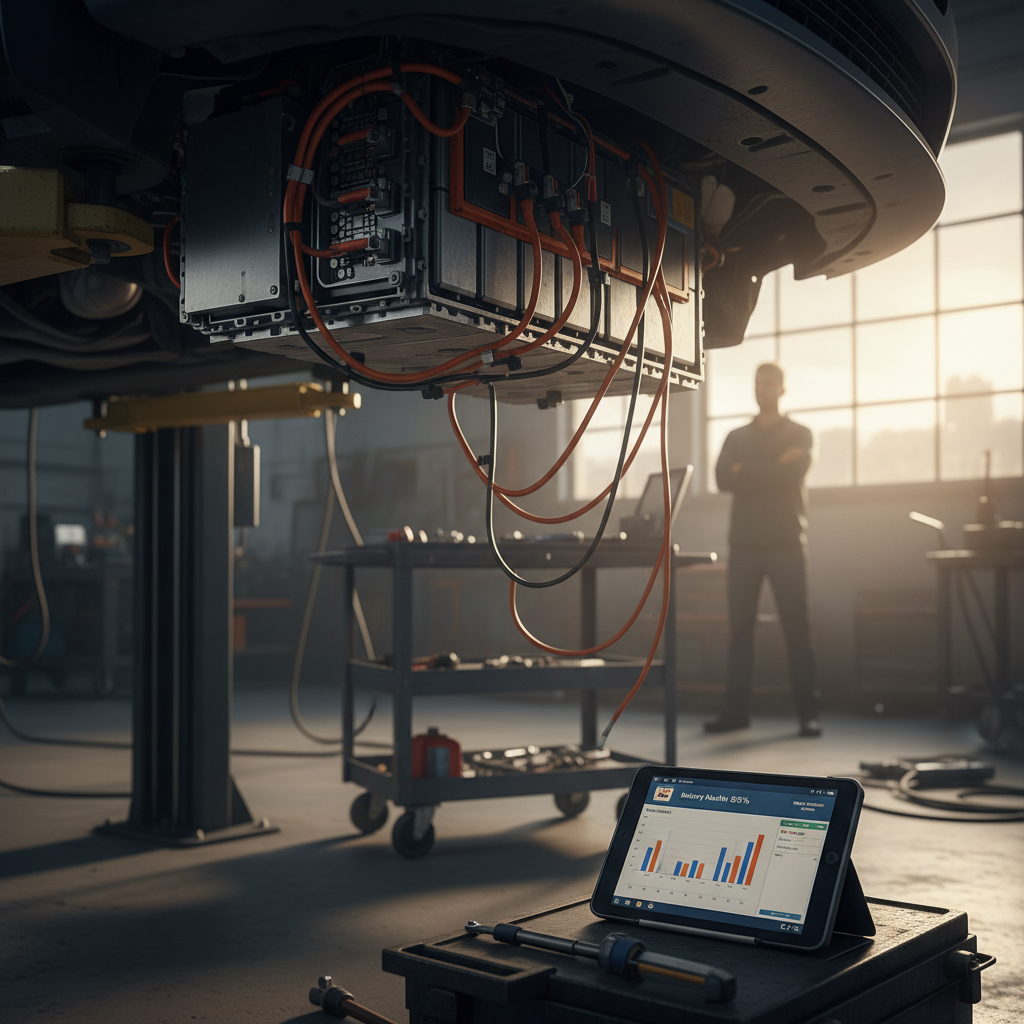If you’ve got a growing family, a carpool to cover, or just a lot of friends and gear, an electric 7 seater SUV is suddenly a very real option instead of a future promise. A few years ago, you were basically limited to concept cars and waitlists. Today, you can walk into a showroom, or browse used listings online, and find multiple three‑row electric SUVs that can haul seven people in quiet, battery‑powered comfort.
Quick definition
Why shoppers want an electric 7-seater now
Seven‑seat EVs are hitting a sweet spot for American families. You get the high seating position and space of a big SUV, the quiet, instant torque of an EV, and the ability to ditch regular gas‑station visits. Models like the Kia EV9, Rivian R1S, and Cadillac Escalade IQ prove you no longer have to choose between people‑moving and going electric.
- More people and pets: three rows means room for kids, grandparents, and that last‑minute friend from soccer practice.
- Lower running costs: electricity is often cheaper per mile than gasoline, especially if you charge at home on off‑peak rates.
- Quieter, calmer cabins: electric powertrains cut noise and vibration, which matters when the second row is melting down on I‑95.
- Access to future charging networks: newer models increasingly include NACS (Tesla) compatibility for road trips.
Tip for growing families
Every electric 7-seater SUV you can buy or order today
As of late 2025 in the U.S., the list of true three‑row electric SUVs is still short, but it finally covers a range of budgets, from the relatively attainable Kia EV9 to ultra‑luxury choices like the Mercedes‑Benz EQS SUV and Cadillac Escalade IQ. A few others, like the Volkswagen ID. Buzz and Lucid Gravity, are just beginning to reach customers.
Snapshot of today’s 7-seat EV SUV market
Key electric 7-seater SUVs on the U.S. market
Headline specs for some of the most important three‑row electric SUVs you can buy or order today. Ranges are manufacturer estimates and can vary by wheel and battery choice.
| Model | Seats | Est. Range (mi) | Starting Price* | Notable Strength |
|---|---|---|---|---|
| Kia EV9 | 6–7 | ~230–304 | ~$55k–$60k | Mainstream pricing, adult‑friendly third row |
| Rivian R1S | 7 | Up to ~400 | ~$77k+ | Adventure‑ready, long range and strong towing |
| Cadillac Escalade IQ | 7 | Est. ~460 | ~$127k+ | Huge space and range, true luxury cruiser |
| Mercedes‑Benz EQS SUV | 5–7 | Low 300s | ~$90k+ | Quiet, tech‑heavy luxury with optional 3rd row |
| Volkswagen ID. Buzz (3-row) | 7 | Low 230s | ~$60k+ | Electric minivan vibe, tons of interior volume |
| Lucid Gravity (7-seat option) | 7 | Up to ~430+ | ~$98k+ | Big range and performance in a sleek package |
Always check the specific trim and wheel package, range and seating layouts can change.
About those numbers
Mainstream hero: Kia EV9
The Kia EV9 is the first truly mainstream electric 7 seater SUV. It’s slightly smaller than Kia’s gas‑powered Telluride, but still offers adult‑friendly space in all three rows and a cabin that feels more like a high‑end family lounge than a science project. Range lands around the 230–300‑mile mark depending on battery and drivetrain, and DC fast‑charging is genuinely quick, adding roughly 100 miles in around 10–15 minutes when conditions are right.

Adventure luxury: Rivian R1S
If you need your electric 7‑seater to reach trailheads, mountain cabins, and muddy soccer fields, the Rivian R1S is the adventure rig of the bunch. All versions are three‑row by default, with strong off‑road capability, serious towing, and long‑range battery options that can crest 350–400 miles when configured conservatively. It’s pricey and a bit firmer‑riding than some rivals, but it feels purpose‑built for families who treat every weekend like a mini expedition.
High-gloss luxury: Mercedes EQS SUV & Cadillac Escalade IQ
At the top of the market, the Mercedes‑Benz EQS SUV and Cadillac Escalade IQ lean hard into luxury. The EQS SUV can be ordered with an optional third row, wrapping passengers in soft leather and tech like the dash‑wide Hyperscreen. The Escalade IQ takes the familiar Escalade formula, massive interior, big presence, and reimagines it on a dedicated EV platform with an estimated range that can approach 460 miles when properly configured. If you want an electric 7 seater that feels like a rolling living room, these are your headliners.
Electric 7-seater SUVs that are coming soon
The pipeline for three‑row EVs is finally filling up. Over the next couple of years, more brands will roll out dedicated electric 7‑seater models or add third‑row options to existing SUVs.
Notable upcoming electric 7 seaters
A look at a few headline‑grabbers headed for showrooms or already launching in limited numbers.
Volkswagen ID. Buzz (U.S. 3-row)
Lucid Gravity
Global players
What about plug-in hybrids?
Space, comfort, and cargo: How electric 7-seaters really fit your family
On paper, every electric 7 seater promises "room for the whole family." In reality, the battery pack sitting under the floor changes how that space feels. Some models prioritize a limo‑like second row, others give generous headroom and legroom to the third row, and cargo space behind that third row can range from "weekend away" to "airport‑run plus a Costco stop."
Third-row reality check
In models like the Kia EV9 and Rivian R1S, the third row can genuinely fit adults for more than a quick dinner run. In some luxury entries, the third row is better for kids or shorter trips.
- Seat height: Batteries raise the floor, so check if your knees sit too high.
- Access: Power‑sliding second‑row seats help wrangling car seats and boosters.
- Headroom: Panoramic roofs are lovely, but make sure they don’t steal too much space.
Cargo with all 3 rows up
This is where three‑row EVs separate themselves. Big rigs like the Escalade IQ and R1S offer genuinely useful room behind the third row, while some smaller luxury models leave you juggling soft bags.
- Look for under‑floor storage and clever cubbies.
- A front trunk (frunk) can swallow charging cables and dirty gear.
- Fold‑flat third rows transform these SUVs into giant electric wagons.
Bring your gear to the test drive
Range and charging realities for a 7-seat EV
Three‑row SUVs are big, tall, and heavy, even when they burn gas. Add a battery pack and a full cabin, and it’s clear why range is such a hot topic. The good news: modern electric 7 seaters offer ranges that make daily family life easy. The nuance: your actual range will depend heavily on how and where you drive.
How a 7-seat EV’s range behaves in the real world
Think in scenarios, not just official EPA numbers.
Around town
Highway trips
Cold weather
Watch weight and wind
Charging questions to answer before you buy
1. Where will you charge most often?
Home Level 2 charging (a 240‑volt outlet or wall box) transforms ownership, your electric 7 seater leaves every morning with a “full tank.” If you rely mostly on public fast charging, focus on models with strong charging speeds and Tesla Supercharger (NACS) access.
2. How fast does it fast‑charge?
Look for peak DC fast‑charge rates and, more importantly, how long the SUV holds those speeds. Some models can add roughly 200 miles in 15–25 minutes under ideal conditions.
3. Is NACS (Tesla) support built‑in?
By 2026, most major automakers will ship NACS hardware or adapters, opening up a huge Supercharger network. If you buy now, confirm whether your SUV includes NACS access at delivery or via a promised adapter.
4. What’s your typical daily mileage?
If you drive 40–60 miles a day, nearly any current 7‑seat EV has more than enough range. For frequent 200‑mile family drives, prioritize the longest‑range battery options.
Electric 7-seater costs: Upfront price vs long‑term savings
A fully loaded Escalade IQ stickers like a house; a well‑specced EV9 looks downright sensible by comparison. But sticker price is only one part of the story. An electric 7 seater usually costs more up front than a comparable gasoline SUV, yet it can claw back that difference over years of lower fuel and maintenance costs.
Where the money goes up front
- Battery size: Bigger packs mean longer range, and higher price.
- Luxury features: Air suspension, high‑end audio, and leather interiors add quickly.
- Fast‑charging hardware: High‑power DC capability and dual onboard chargers can cost more now, but pay off if you road‑trip often.
Where you save over time
- Electricity vs gas: Charging at home can cut energy cost per mile dramatically versus filling a large gas SUV.
- Maintenance: No oil changes, fewer moving parts, and less brake wear thanks to regen.
- Incentives: Federal and state EV credits or HOV perks can lower costs further, especially on qualifying trims or used models.
Used can be a smart play
Should you buy your electric 7-seater new or used?
With such a new segment, it’s natural to wonder whether a used electric 7 seater is a smart buy or a gamble. The answer depends on how comfortable you are with early‑adopter tech, warranties, and, above all, battery health.
New vs used electric 7 seater: Quick comparison
Both paths can make sense, here’s how they typically shake out.
Buying new
- Latest tech, safety, and range improvements.
- Full factory warranty and battery coverage.
- Ability to spec your ideal trim and color.
- Higher upfront cost, slower depreciation in the first few years.
Buying used
- Lower purchase price and insurance cost.
- You can target trims with better range or options.
- Battery health varies, this is the big question.
- Software and charging standards may be one generation behind.
How Recharged fits in
How to choose the right electric 7-seater for your life
Choosing an electric 7 seater isn’t about chasing the highest range number or the biggest screen. It’s about matching the vehicle’s strengths to how you actually live: where you drive, how many people you haul, what you tow, and how often your calendar says "road trip" instead of "commute."
Fit-check: Is this electric 7 seater right for you?
1. Map your family and gear
List out who rides with you most weeks, how often you have all three rows filled, and what you always carry (stroller, sports gear, instruments). Make sure you’ve sat everyone in the second and third rows with that stuff on board.
2. Be honest about your road trips
If you do two big cross‑country drives a year, you might prioritize long‑range models like the R1S or Escalade IQ. If your "long trip" is two hours to the lake, an EV9‑class range is often plenty.
3. Check your charging reality
Can you install a 240‑volt outlet in your garage or driveway? Great, home charging opens up more options. If you live in an apartment, look for an electric 7 seater with strong fast‑charging and a robust public‑charging plan.
4. Decide how much luxury you value
A well‑optioned EV9 delivers a lot of comfort and tech without crossing into six‑figure territory. If you want massage seats, ultra‑premium audio, and flagship badges, the Mercedes EQS SUV and Escalade IQ are where you’ll end up.
5. Think about future resale
Models with strong range, popular trims, and support for evolving standards like NACS should hold value better over time, especially as more families look to buy used electric 7 seaters.
“The best family car is the one that disappears into the background, quiet, comfortable, and always ready, so you can focus on the chaos in the seats, not under the hood.”
Electric 7-seater FAQ
Frequently asked questions about electric 7-seater SUVs
Electric 7 seaters have finally moved from "someday" to "ready when you are." Whether you lean toward a value‑packed Kia EV9, an adventure‑first Rivian R1S, or a luxury barge like the Escalade IQ, the key is to shop with your real life in mind, how you drive, who you haul, and where you’ll plug in. If you’re considering a used three‑row EV, working with a specialist like Recharged means you’ll see verified battery health and fair pricing up front, so you can focus on finding the electric 7 seater that turns every family trip into something a lot quieter, cleaner, and more enjoyable.

